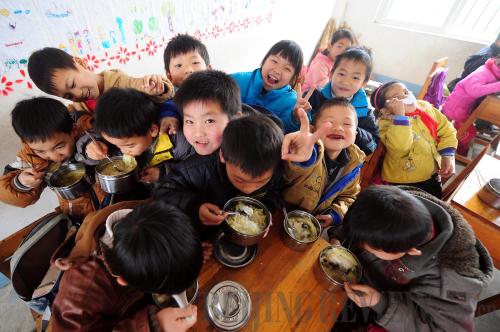|
 |
|
FREE LUNCH: Students in Neixue Primary School in Mashan County, southwest China's Guangxi Zhuang Autonomous Region, enjoy their free nutritional lunch at school on March 3 (HUANG XIAOBANG) |
For poor students in boarding schools in Mashan County, southwest China's Guangxi Zhuang Autonomous Region, March 5 marked a turning point in their lives. The county government announced that from that day on, 24,186 students from poor families in the county's boarding schools would be entitled to three free meals a day at school.
The provision of free meals is part of efforts to implement a national program to improve the nutrition of rural students in the nine-year compulsory education period. The program was released by the State Council on October 26, 2011.
The State Council decided to pilot the nutrition improvement program in 680 poor counties including Mashan. Under the program, each rural student in elementary and junior middle schools in the pilot areas is entitled to a 3-yuan ($0.47) meal subsidy per day.
The program, with an estimated annual cost of 16 billion yuan ($2.53 billion), is expected to benefit 26 million rural students, or nearly 30 percent of all rural students in central and west China, said the Ministry of Education.
Mashan is situated in a hilly region. In the past, most local schools did not have canteens, and students at boarding schools had to bring a week's supply of food from home. The majority of students subsisted on a simple diet of steamed rice with soy beans and salt.
The Mashan County Government decided that from March 5, the nutritional meal subsidy from the Central Government would be used to pay for eligible students' lunches, whereas the cost of breakfast and supper would be covered by the living allowance that the government has provided to poor rural boarding students in the compulsory education period since 2003.
In Mashan, the government has worked with NGOs to provide nourishing meals to students since last May. Last year, the county government spent more than 9 million yuan ($1.42 million) building canteens for schools, although the county's total fiscal revenue last year was only 260 million yuan ($41 million).
In Dongqi Primary School in Linwei Town, the spacious and well-lit kitchen was built with 10,000 yuan ($1,580) from public funds.
In addition to government fiscal support, many schools in Mashan have also received assistance from businesses and social organizations.
The kitchen equipment in Dongqi Primary School, including rice steamers, water boilers, soy bean milk makers and a meat mincer, were donated by Joyoung Hope Kitchen Foundation founded by Joyoung Co. Ltd., a major producer of kitchen utensils in China.
Joyoung has donated kitchen utensils worth more than 600,000 yuan ($94,878) to 23 primary and middle schools in Linwei.
"In addition to kitchen utensils, the Dongqi Primary School has received an additional 'free lunch' subsidy from the China Social Welfare Foundation, a non-governmental organization," said Huang Yaxi, the school's headmaster. The foundation provides 1 yuan ($0.15) per student per day on top of the Central Government's 3-yuan nutritional meal subsidy to cover the cost of lunch.
After the national nutrition improvement program was launched, the 21st Century Education Research Institute based in Beijing conducted a study on the program's implementation. On February 28, the institute released a report saying that most schools piloting the program did not have sufficient funds to acquire cooking and dining facilities and pay staff to prepare and serve meals.
| 